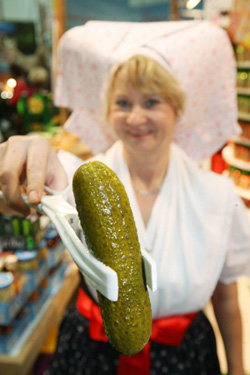|
  
- 现金
- 12697 元
- 精华
- 10
- 帖子
- 7635
- 注册时间
- 2011-4-1
- 最后登录
- 2013-12-12




















|
The WHO Says Cellphones—and Pickles—May Cause CancerShould I stop eating kosher dills?By Brian PalmerPosted Wednesday, June 1, 2011, at 3:00 PM ET Could this pickle kill you?The World Health Organization classified cellphones as "possibly carcinogenic" on Tuesday, placing them in a category that includes the pesticide DDT, engine exhaust, and pickled vegetables. Wait ... pickled vegetables? Could this pickle kill you?The World Health Organization classified cellphones as "possibly carcinogenic" on Tuesday, placing them in a category that includes the pesticide DDT, engine exhaust, and pickled vegetables. Wait ... pickled vegetables?
Yup, pickled vegetables. When Chinese hospitals started systematically tracking cancer incidence 50 years ago, they found that certain regions suffered from startlingly high rates of esophageal squamous cell carcinoma, a cancer of the cells lining the esophagus. Epidemiologists observed that people in these areas relied on fermented vegetables for nutrients for long parts of the year, when fresh veggies weren't available. Researchers now think the culprit is the fungi responsible for the fermentation process. As part of their natural life cycle, the microorganisms release a variety of possible carcinogens.
Doctors have repeatedly attempted to substantiate the connection between pickled vegetables and cancer through clinical studies, with mixed results. But, taken as a whole, there does seem to be an association. A 2009 review of the existing studies conducted across Asia concluded that regularly eating pickled vegetables roughly doubles a person's risk for esophageal squamous cell carcinoma.
Since uncovering that possible link, researchers have started to blame other cancers on the humble pickle. For example, gastric-cancer rates are unusually high in South Korea and Japan, even though both countries consume large amounts of cancer-fighting veggies. (South Koreans eat 73 percent more vegetables, and Japanese 34 percent more, than do Americans. Americans eat about 70 percent more veggies than Northern Europeans do.) The problem, according to a series of studies, may be that many of those vegetables are pickled.
This doesn't mean you should put on a biohazard suit and toss your pickles into the trash. Not all pickles are created the same. Pickling generally means preserving a food in an acid, but that acid can come from a number of sources. In the aforementioned cancer-plagued regions of China, they place the vegetables in jars and cover them with saltwater. The solution provides an ideal environment for microbes that consume the food's sugars. As they digest those sugars, the microbes release acid, alcohol, and other flavor-enhancing compounds—as well as, apparently, some carcinogens.
Advertisement
Anyone who has brewed up their own pungent batch of fermented kimchi or kosher dills knows that the process can take weeks or months to complete. Some people, including major food conglomerates, don't have that kind of time. Instead of waiting for the microbes to acidify the contents of the jar, most major cucumber-pickle manufacturers just cover their cukes in dilute vinegar from the beginning. The mixture is usually pasteurized, preventing any fermentation.
As far as the Explainer can tell, there's no evidence suggesting that directly acidified, nonfermented cucumbers—the kind you probably buy at large grocery stores—cause cancer. It would be hard to conduct a clinical study, though, because Americans eat just four pounds of pickles per year [PDF]. The methodologies and questionnaires vary, but participants in Asian pickle studies generally report eating pickled vegetables several times per week.
While commercial pickles might not belong in the same "possibly carcinogenic" category as their fermented cousins, they do have their problems. Some researchers believe fermentation alone doesn't fully explain the higher rates of gastric cancers in Japan and South Korea, and they suggest that the nutrients that enable fresh vegetables to prevent cancer may degrade in the acidic solution. So don't fulfill your recommended daily vegetable intake with pickles. Most pickles also contain high levels of sodium, which is widely believed to increase the risk of stomach cancer.
Got a question about today's news? Ask the Explainer.
|
|